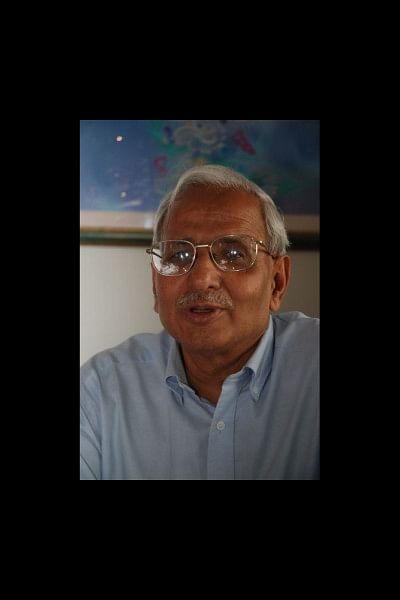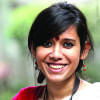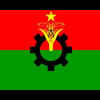'An election at this time will not solve our problems under the present constitutional provisions'

The Daily Star (TDS): In the current political situation, how effective do you think your endeavour of initiating a dialogue between the two parties will be, when both parties seem adamant in holding on to their respective positions?
Badiul Alam Majumdar (BAM): Negotiation is the language of democracy, and politics the art of compromise. People are getting fed up and voices are being raised in the country. The initiative we took is a reflection of that voice, of people's expectations. We expect that the political parties will come together and in the best interest of the people, sit down and ultimately solve the problem amicably. There will have to be a negotiation or settlement of the issues. Otherwise we will be in deep trouble as a nation, facing an uncertain future.
Even mortal enemies sit down together. If we look at our own history, the CHT Peace Accord was signed between the government and the Shanti Bahini. Though they indulged in activities that were very serious, we realised that we would have to sit down and settle the issue. In 1990, the two major political parties, BNP and AL, forged a joint declaration. So it has happened before.
As you can see, there are even international players, and our development partners and the UN is getting anxious and speaking out. The UN secretary general himself is concerned about the situation in Bangladesh. All these will put some pressure on the parties. When we say parties, we don't just mean the two political parties; dialogue must take place in the broader context, with the involvement of other stakeholders.
TDS: What should come first: ending violence or initiating talks? If the government were to relent to all the national and international pressure and sit in dialogues, it would almost seem as if the BNP violence has paid off.
BAM: Our position is that both things should take place parallelly. This sheer madness cannot go on. The opposition needs to realise that this violence cannot go on forever and come to their senses. Similarly, the ruling party has to realise that they cannot win by using force in the long run. Otherwise we will become a totalitarian state and that will not be in the best interest of anyone. A fascist type of force will emerge, and we may end up having an extremist Taliban type of force in response to the totalitarian state. I say often that if you play fire with fire, you end up with ashes. I am sure there are enough people in both parties and even outside who see this possibility and will do their part to avoid this.
As for violence paying off, is that not what has happened before? In '96, the AL-led alliance was able to force the BNP to swallow the caretaker pill. You can look at it as win and lose, but the position of the ruling party is unsustainable and unreasonable.
TDS: But some would argue that if AL doesn't take a strong stance, then the country would turn towards religious extremism/fascism.
BAM: People need to understand that these two parties are the only ones in the middle – be it right of the middle or left of the middle. And they don't really have any major differences if you look at their economic policies or party politics, for instance.
Some people instigate and churn irresponsible rhetoric that they have to annihilate each other. This is unrealistic. We have to have inclusive politics, face each other, live together. So we have to address this politically; we cannot take a group of people and drop them in the Bay of Bengal. Pluralism is an essence of democracy. Some people may say, "We will annihilate them" or "If we don't annihilate them, they will finish us", but that is not possible.
TDS: Even if they were to sit in dialogue, there are some core issues that need to be resolved for any sustainable outcome of the dialogue.
BAM: We need a sustainable solution, and the instability we see every few years, during or post-elections, must come to an end. What we expect is consensus on certain major issues. And I categorise them into three sets of issues: 1) election-time government to ensure peaceful transfer of power and participatory elections; 2) election-time conditions, e.g. changes to the constitution of the election commission and the legal framework. Beyond these, to prevent such instability in the future, we'll have to initiate deep reforms on some major national issues. E.g. the parties must come to an agreement about the completion of the war crimes trial and the judgments must be put into effect in the quickest possible time. And the Jamaat issue also needs to be resolved. The govt. can make this decision on its own under the existing constitution or through the parliament. In addition, political parties must be made democratic and accountable and parliament must be effective. Looting, squandering, and corruption, must be addressed and my personal view is that there should be ICT-like special tribunals to try corruption cases.
In a nutshell, we (Sujon) are proposing an agreement on these three sets of issues and urging that a national charter be formulated and signed. This is not yet the position of the platform.
TDS: The reaction of the government has not been very positive. You are being termed as mavericks, even architects of 1/11. How would you respond to that?
BAM: These are rhetoric, and as Dr Huda has said a couple of days ago, at times politicians make statements that are not their final words. As the politicians love to say, there is no last word in politics. Furthermore, we urge the politicians to rethink and realise the gravity of the situation and change their minds.
TDS: If the initiative for a dialogue fails, what role, if any, can the civil society play to end this stalemate?
BAM: The civil society is not that strong in this country and everybody is divided, be it the journalists, lawyers, teachers or intellectuals. All of them were united until 1990, but patronised politics in the succeeding years is really responsible for making the civil society partisan. Only a very limited number of people who speak their minds can be viewed as non-partisan. I don't think civil society really has the strength to impose something, but then again, our initiative has captured the imagination of many. Even though we are not as strong as we were in the 1990s, we feel that the politicians will come to acknowledge that the positions they are taking do not have wide public support.
TDS: Is ultimately an election the way out of this situation?
BAM: Election-related dispute in a sense is the tip off the iceberg. The current violence obviously must be condemned, and culprits brought to justice. Having said that, the danger we now find ourselves in was not altogether unexpected. I spoke to one of our most esteemed lawyers a few days ago, who was an amicus curiae when the 15th Amendment was placed in front of the Supreme Court. He had warned, 'There will be civil war if you proceed'. If you look at the parliamentary proceedings of the Parliamentary committee, all the senior politicians came to a consensus, including Tofael Ahmed, Rashed Khan Menon and Suranjit Sengupta that caretaker system must not be abolished. They had predicted that it would lead to dire consequences. I strongly believe that the 15th Amendment is the real reason for this political impasse.
If the ruling party says there should be another election under the present constitutional system, it would not solve the underlying problems. I am on recording saying that if there is no neutral system, the partisan law enforcement and bureaucracy will make sure that the ruling party returns to power again, because otherwise many of them will face the music. In my view, having an election at this time will not solve our problems under the present constitutional provisions. We need a negotiated settlement of the three sets of issues I have mentioned, which will hopefully lead to a sustainable solution.

 For all latest news, follow The Daily Star's Google News channel.
For all latest news, follow The Daily Star's Google News channel. 








Comments